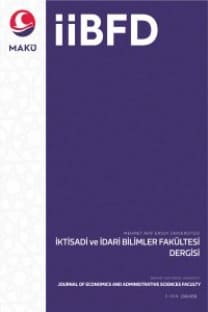SÜRDÜRÜLEBİLİR KALKINMADA GÜVENLİK: BİRLEŞMİŞ MİLLETLERİN 2030 SÜRDÜRÜLEBİLİR KALKINMA GÜNDEMİ İLE BİNYIL BİLDİRGESİNİN KARŞILAŞTIRILMASI
Bu çalışma, güvenlik düşüncesi ve politika bileşenlerinde (amaçlar, hedefler, ilkeler, öncelikler vb.) zaman içerisindeki değişiklikleri keşfetmek amacıyla, Birleşmiş Milletlerin 2030 Sürdürülebilir Kalkınma Gündemi ile Binyıl Bildirgesini güvenlik kavramsallaştırmaları bağlamında karşılaştırmayı amaçlamaktadır. Böylece, Birleşmiş Milletlerin ulusal güvenlik politikalarına ve örgütlenmelerine ilişkin üye devletlerden beklentilerinin ortaya çıkarılabileceği öngörülmektedir. Güvenlik düşüncesi, Birleşmiş Milletlerin sürdürülebilir kalkınma yaklaşımıyla birlikte 1980’lerin sonundan itibaren değişmiştir. Güvenlik düşüncesindeki bu değişim, insani kalkınma ve güvenlik-kalkınma bağını içermektedir. Tüm devletleri yükümlü tutan Binyıl Bildirgesi ve 2030 Sürdürülebilir Kalkınma Gündemi, Birleşmiş Milletlerin sürdürülebilir kalkınma politikasına ilişkin başlıca ve en güncel sonuç belgelerini oluşturmaktadır. Her iki belge de güvenlik bileşenlerine sahiptir. Bu, güvenlik ile ilgili bileşenlerin çıkarılmasına ve analitik bir şekilde karşılaştırılmasına imkan vermektedir. Son olarak, bulgular ulusal seviyede kamu politikası ve örgütlenmesi bağlamında karşılaştırılmakta ve tartışılmaktadır.
Anahtar Kelimeler:
Güvenlik, Sürdürülebilir Kalkınma, Kamu Politikası, Birleşmiş Milletler
SECURITY IN SUSTAINABLE DEVELOPMENT: COMPARING UNITED NATIONS 2030 AGENDA FOR SUSTAINABLE DEVELOPMENT WITH MILLENNIUM DECLARATION
This study aims to compare United Nations 2030 Agenda for Sustainable Development with Millennium Declaration in terms of their security conceptualizations to explore changes in security thinking and policy components (goals, targets, principles, priorities etc.) over time. In doing so, it is envisaged that United Nations’ expectations from member states regarding their national security policies and organizations could be revealed. Security thinking has changed since late 1980’s with the introduction of sustainable development approach by the United Nations. This shift in security thinking encompasses human security and security-development nexus. Holding all member states responsible, Millennium Declaration and 2030 Agenda for Sustainable Development constitute the primary and the most recent outcome documents of United Nations’ sustainable development policy. Both documents have security components. This enables extracting security elements and comparing them with an analytical manner. Consequently, findings are compared and discussed in terms of public policy and organization at national level.
Keywords:
Security, Sustainable Development, Public Policy, United Nations,
___
- BRIASSOULIS, H. (2005), “Analysis of Policy Integration: Conceptual and Methodological Considerations“, Policy Integration for Complex Policy Problems: The Example of Mediterranean Desertification, (Editor: H. BRIASSOULIS), Ashgate, Aldershot, 81-116.
- DIMAGGIO, P. J, and POWELL, W. W. (1991), “Introduction“, The New Institutionalism in Organizational Analysis, (Editor: W. W. POWELL and P. J. DIMAGGIO), The University of Chicago Press, Chicago, 1-37.
- DOLOWITZ, D. P., and MARSH, D. (2000), “Learning from Abroad: The Role of Policy Transfer in Contemporary Policy-Making“, Governance: An International Journal of Policy and Administration, 13 (1), 5-24.
- DREZNER, D. W. (2001), “Globalization and Policy Convergence”, International Studies Review, 3 (1), 53-78.
- DUFFIELD, M. (2010), “The Liberal Way of Development and the Development-Security Impasse: Exploring the Global Life-Chance Divide“, Security Dialogue, 41 (1), 53-76.
- EVANS, M., & DAVIES, J. (1999), “Understanding Policy Transfer: A Multi-Level, Multi-Disciplinary Perspective“, Public Administration, 77 (2), 361-385.
- HRYCHUK, H. (2009), “Combating the Security Development Nexus? Lessons Learned from Afghanistan“, International Journal, 64 (3), 825-842.
- INTERNATIONAL PEACE ACADEMY (2004), “The Security-Development Nexus: Conflict, Peace and Development in the 21st Century“, New York Seminar 2004, 3-7 May, New York.
- JACKSON, P. (2015), “Introduction: Security and Development“,The Handbook of International Security and Development, (Editor: P. JACKSON), Edward Elgar Publishing, Cheltenham, 1-15.
- KNILL, C. (2005), “Introduction: Cross-National Policy Convergence: Concepts, Approaches and Explanatory Factors“, Journal of European Public Policy, 12 (5), 764-774.
- KRAHMANN, E. (2008), “Security: Collective Good or Commodity?”, European Journal of International Relations, 14 (3), 379-404.
- MARCH, J. G. and OLSEN, J. P. (1984), “The New Institutionalism: Organizational Factors in Political Life“, The American Political Science Review, 78 (3), 734-749.
- MEIJERS, E., and STEAD, D. (2004), “Policy Integration: What Does It Mean and How Can It Be Achieved?: A Multi-Disciplinary Review“, 2004 Berlin Conference on the Human Dimensions of Global Environmental Change: Greening of Policies-Interlinkages and Policy Integration, 3-4 December, Berlin.
- NIKOLAISEN, T. (2011), Security Sector Reform: A New Framework for Security Assistance? The Security-Development Nexus Impact on Policies Towards the South, Norwegian Institute of International Affairs, Norway.
- PARIS, R. (2001), “Human Security: Paradigm Shift or Hot Air? “, International Security, 26 (2), 87-102.
- SCHNABEL, A. (2012), “The Security-Development Discourse and the Role of SSR as a Development Instrument“, Back to the Roots: Security Sector Reform and Development, (Editors: A. SCHNABEL and V. FARR), Geneva Centre for the Democratic Control of Armed Forces, Switzerland, 29-73.
- STERN, M., and ÖJENDAL, J. (2010), “Mapping the Security-Development Nexus: Conflict, Complexity, Cacophony, Convergence? “, Security Dialogue, 41 (1), 5-30.
- STONE, D. (2004), “Transfer Agents and Global Networks in the Transnationalization of Policy“, Journal of European Public Policy, 11 (3), 545-566.
- UNDP (1994), Human Development Report 1994, New York.
- UNITED NATIONS (1987), Report of the World Commission on Environment and Development: Our Common Future, New York.
- UNITED NATIONS (2010), Analyzing and Measuring Social Inclusion in a Global Context, New York.
- UNITED NATIONS (2015), Transforming Our World: The 2030 Agenda for Sustainable Development, New York.
- WORLD BANK (2011), World Development Report 2011: Conflict, Security and Development, Washington, DC.
- ZAEI, M. E. (2013), “Globalization of National Policy-Making: An International Perspective“, Public Policy and Administration, 13 (2), 331-340.
- ISSN: 2149-1658
- Yayın Aralığı: Yılda 3 Sayı
- Yayıncı: Mehmet Akif Ersoy Üniversitesi İktisadi ve İdari Bilimler Fakültesi
Sayıdaki Diğer Makaleler
İHRACAT KREDİ SİGORTASI KAVRAMI, HUKUKÎ NİTELİĞİ VE BENZER KURUMLARLA KARŞILAŞTIRILMASI
BİR İLETİŞİM BİÇİMİ OLARAK EVLİLİĞİN KÜLTÜREL, SİYASİ VE EKONOMİK UNSURLARI (GİRESUN ÖRNEĞİ)
Mustafa GÜLTEPE, Selfiye ÖZKAN
KIRSAL VE KENTSEL ALANLARDA YAŞLANMA, YAŞLILIK VE YAŞLILAR: DENİZLİ İLİ ÖRNEĞİ
BATI BALKANLAR’DA AVRUPALILAŞMA VE AVRUPALILAŞMAYI SAĞLAYAN SİYASAL MEKANİZMALAR
